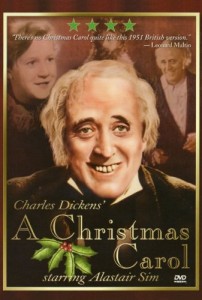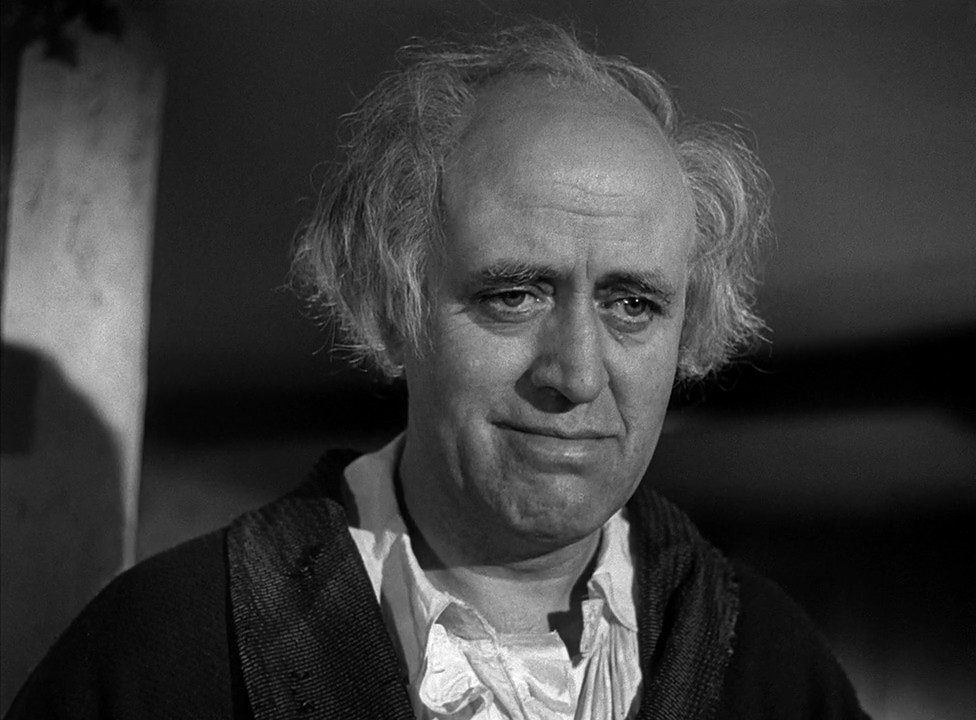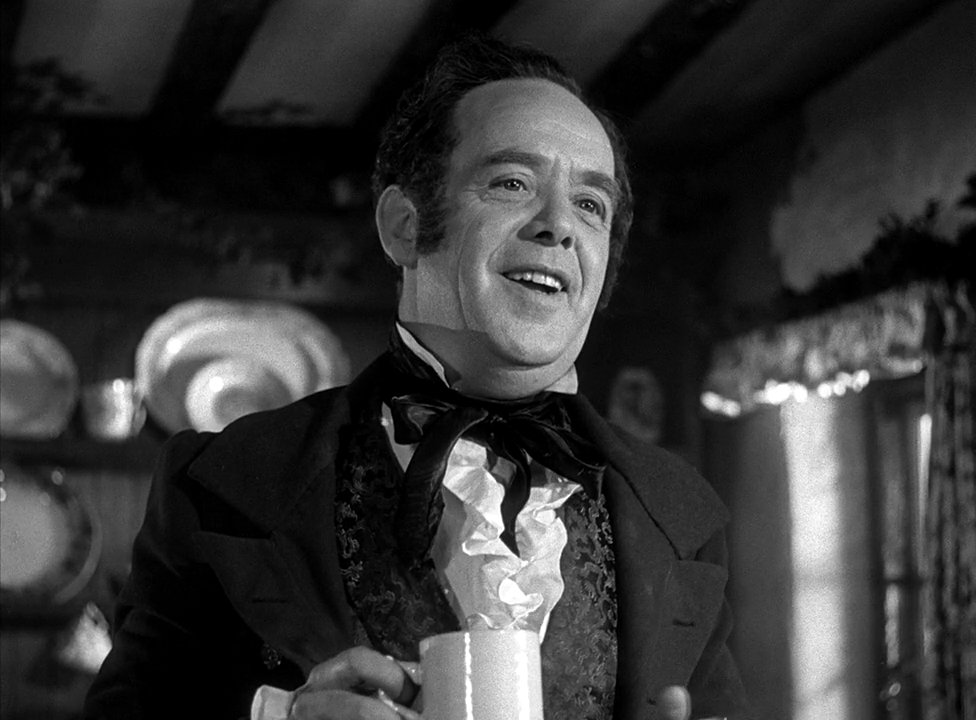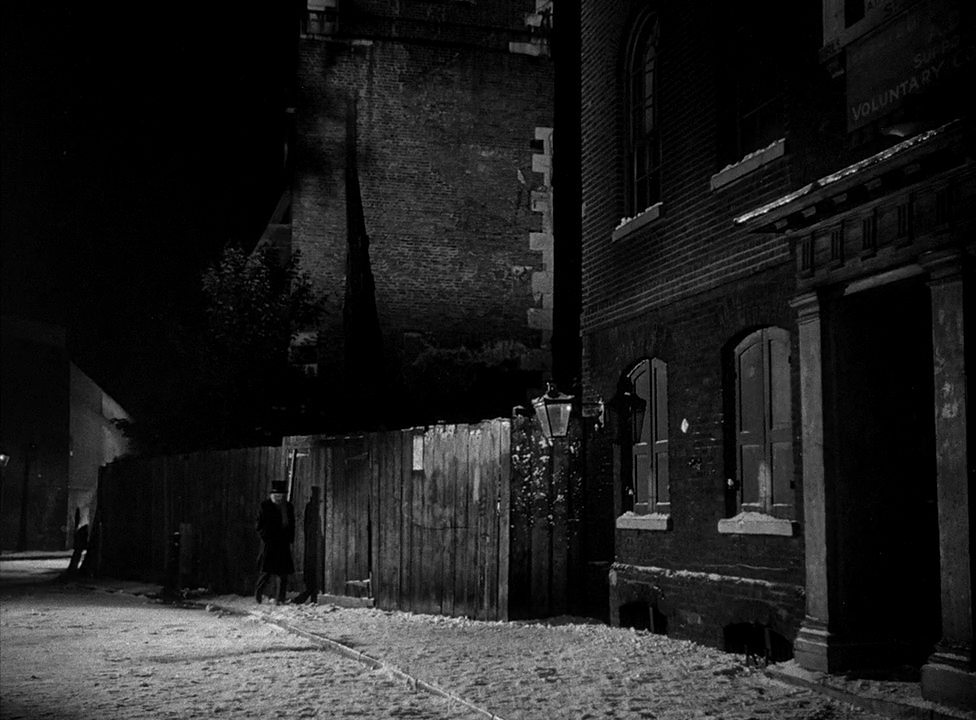“Go and redeem some other promising young creature, but leave me to keep Christmas in my own way.”
|

Synopsis:
Miserly Ebenezer Scrooge (Alastair Sim) is visited by the ghost of his former business partner (Michael Hordern), as well as the spirits of Christmas Past (Michael Dolan), Christmas Present (Francis De Wolff), and Christmas Yet To Come (C. Konarski), all of whom attempt to help him mend the error of his ways.
|
|
Genres, Themes, Actors, and Directors:
- Alastair Sim Films
- Character Arc
- Christmas
- Fantasy
- Flashback Films
- Ghosts
- Greed
Review:
This mid-century British version of Dickens’ classic Christmas-time parable is viewed by some critics — including Peary — as the best of numerous cinematic adaptations. It’s notable primarily for Alastair Sim’s definitive performance in the lead role as Ebenezer Scrooge, a widely disliked miser who undergoes a tremendous change of heart during the most terrifying and life-altering night of his existence. Sim manages to effectively humanize Scrooge to the extent that we eventually sympathize with this notoriously miserable codger — a man who (according to Peary in Alternate Oscars) “is initially heartless and friendless, as stingy with kindness as he is with money”, who “curses Christmas, shoves aside young carolers, and refuses to accept Christmas cheer or give money to help the unfortunate through the holidays”. Noel Langley’s literate screenplay largely respects Dickens’ overall vision and words — though an attempt to explain Scrooge’s cynicism via back stories of his sister’s death during childbirth (just as Scrooge himself was the cause of his own mother’s death) doesn’t quite convince. Narrative quibbles aside, however, this remains a visually sumptuous and heartwarming historical fantasy, one which film fanatics are sure to enjoy.
Note: This is the only cinematic version of A Christmas Carol listed in Peary’s book; are there others that might be considered “Missing Titles”?
Redeeming Qualities and Moments:
- Alastair Sim as Scrooge (Peary votes him Best Actor of the Year in his Alternate Oscars book)

- Mervyn Johns as Bob Cratchit

- C. Pennington-Richards’ cinematography

- Fine period sets

Must See?
Yes, for Sim’s performance, and as an enjoyable Christmas classic. Listed as a film with Historical Importance and a Personal Recommendation in the back of Peary’s book.
Categories
- Good Show
- Noteworthy Performance(s)
Links:
|





2 thoughts on “Christmas Carol, A (1951)”
A must, as a thoroughly captivating adaptation of an oft-told tale. Or, as my friend Joe Nugent puts it, “THE version”.
It’s tempting to say that ‘A Christmas Carol’ (aka ‘Scrooge’) is mainly worth seeing for Sim’s performance – he certainly does anchor things. But, seeing it again after many years, I was struck by how well the film is put together, under Brian Desmond Hurst’s direction of Langley’s very satisfying script. As noted, the cinematography is striking, often somewhat hypnotic (with some imagery quite impressive for the time), and the actors are often interestingly framed for effect. Speaking of which, the cast is uniformly good (and take note, near film’s end, of James Whale favorite Ernest Thesiger in the small role of the undertaker – “I always know.”).
Is this the scariest of genuine Christmas tales? A number of sections can cause one to find it more appropriate for viewing at Halloween. For me, the most frightening image comes when the Spirit of Christmas Present opens his robe to reveal a very young – and neglected – boy and girl at his feet…
Scrooge: Spirit, are these yours?
Spirit: They are Man’s. They cling to me for protection from their fetters. This boy is Ignorance, this girl is Want. Beware them both but, most of all, beware this boy!
The idea of Ignorance beginning as a child, who will only grow large and more ignorant, chills me.
Sim is an inspired choice, to say the least, for playing Scrooge. When I think of his performances, I see Sim as generally warmer, so it’s a particular eye-opener to see him as a character deeply in denial of his own motivation and firm in his sense of superiority. In the early part of the film, it’s easy to sense Sim’s Scrooge almost laughing to himself inside at the ridiculousness of life and the people who inhabit it. …As to that, an interesting piece of IMDb trivia illuminates – it did for me – the meaning of Scrooge’s most ‘cherished’ word: [The word “humbug” describes deceitful efforts to fool people by pretending to a fake loftiness or false sincerity. So when Scrooge calls Christmas a humbug, he is claiming that people only pretend to charity and kindness in a scoundrel effort to delude him, each other, and themselves. In Scrooge’s eyes, he is the one man honest enough to admit that no one really cares about anyone else, so for him, every wish for a Merry Christmas is one more deceitful effort to fool him and take advantage of him. This is a man who has turned to profit because he honestly believes everyone else will someday betray him or abandon him the moment he trusts them.]
As for other versions that might be ‘Missing Titles’, I can only, at the moment, think of the 1970 musical ‘Scrooge’, starring Albert Finney (with Alec Guinness as Jacob Marley’s Ghost, Edith Evans as the Ghost of Christmas Past, and Kenneth More as the Ghost of Christmas Present). On release, it was not well received critically but, with time, it has become popular with audiences. I think it’s enjoyable and worthy of a look.
btw: Merry Christmas!
I watch this version every Christmas Eve and have done since the 1980s and I agree it is THE version. Incidentally, the proper British title for this is Scrooge.